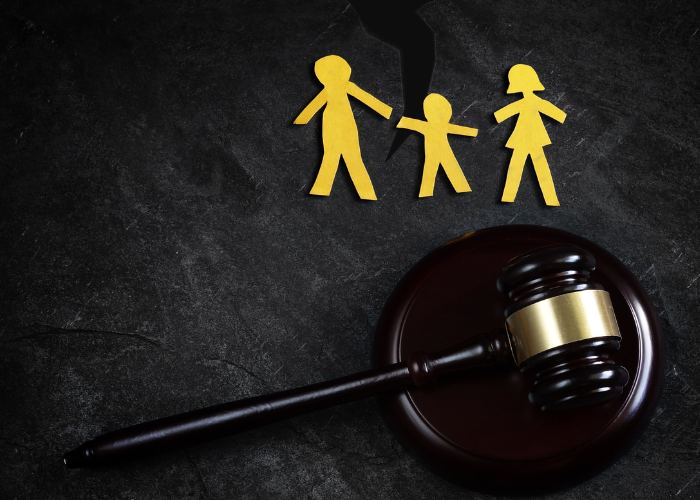Don't Face Challenging Family Law Matters Alone
Navigating family law issues can be overwhelming, often filled with emotional turmoil and uncertainty. At Grace Legal Offices, we understand the complexities and sensitivities involved in these matters. Our experienced family law attorneys are dedicated to providing sound legal advice to families in Harrisburg, PA and throughout Central Pennsylvania. Having a knowledgeable ally by your side is crucial during such challenging times. With decades of collective experience, our team is well-equipped to help you create a tailored legal strategy that prioritizes your best interests and aims for the most favorable outcomes.
Whether you’re dealing with divorce, custody disputes, or other family-related legal challenges, Grace Legal is here to support you every step of the way. Our commitment to client advocacy begins with listening to your unique situation and guiding you through the intricacies of the law. At Grace Legal Offices, we strive to be the valuable asset you need during this difficult time, ensuring you are informed, empowered, and prepared to face the future. Don’t hesitate to reach out for the dedicated support you deserve. Schedule a consultation today and take the first step towards securing your family’s peace of mind.

If you and your family need an advocate, contact us now
Family Law Legal Services
Family law encompasses a wide array of legal issues and concerns that arise within the context of familial relationships. In Pennsylvania, this area of law addresses critical matters such as:
Divorce
Divorce law in Pennsylvania is primarily governed by the Pennsylvania Divorce Code, which outlines the legal process and requirements for obtaining a divorce.
There are two main grounds for divorce: fault and no fault.
In a no-fault divorce, spouses can separate amicably after living apart for a minimum of one year, allowing for a smoother transition in resolving outstanding issues related to property division, alimony, and child custody. In contrast, a fault-based divorce requires one spouse to prove specific reasons for the dissolution, such as infidelity or abuse.
Pennsylvania is an equitable distribution state, meaning that marital property is divided fairly, though not always equally, based on various factors, including the length of the marriage and each party’s financial situation. It is vital for individuals considering divorce in Pennsylvania to seek knowledgeable legal counsel to navigate the complexities of the law and to protect their rights and interests during this challenging time.
Child Custody
In Pennsylvania, child custody law is primarily guided by the principle of serving the best interests of the child.
Custody arrangements can take two forms: legal custody, which refers to the right to make significant decisions regarding the child’s upbringing, and physical custody, which pertains to where the child lives.
Pennsylvania law encourages shared custody arrangements, promoting the child’s relationship with both parents.
When determining custody, the court considers various factors, including the child’s needs, the parents’ capabilities, and the nature of the child’s relationship with each parent.
The ultimate goal is to provide a stable and nurturing environment for the child’s growth and development.
Child Support
In Pennsylvania, child support law is designed to ensure that children receive adequate financial support from both parents following a separation or divorce.
The Pennsylvania Child Support Guidelines establish a formula that calculates the amount of support based on the income of both parents, the number of children, and other expenses such as healthcare and education.
Typically, the non-custodial parent pays child support to the custodial parent to assist with the child’s living expenses, which is evaluated and adjusted periodically.
Both parents must understand their financial responsibilities to promote the child’s well-being and stability during such transitions.
Domestic Violence & Protection From Abuse (PFA) Orders
In Pennsylvania, domestic violence law aims to protect individuals from abuse within intimate partner or family relationships.
The state’s Protection from Abuse (PFA) Act allows victims to seek legal protection by filing a petition for a PFA order, which can provide vital safeguards such as prohibiting the abuser from contact, granting temporary custody of children, and establishing support obligations.
The court typically schedules a hearing to evaluate the evidence and determine whether to grant the order.
Domestic violence laws also allow for criminal charges against abusers, promoting accountability while ensuring that victims have access to essential resources and support during challenging times.
Parental Rights
Parental rights law in Pennsylvania is designed to protect the legal rights of parents regarding their children’s upbringing and welfare.
Under Pennsylvania law, both biological and adoptive parents have inherent rights to make decisions about their child’s education, health care, and general welfare.
In cases of divorce or separation, parental rights are assessed based on the child’s best interests, which may involve considerations of custody and visitation.
Termination of parental rights can occur under specific circumstances, such as abuse or neglect, and is subject to a rigorous legal process to ensure the child’s protection. Parents should seek legal guidance to navigate these complex issues effectively.
Grandparents’ Rights & Visitation
In Pennsylvania, grandparents’ rights law allows grandparents to seek custody or visitation with their grandchildren under certain circumstances.
When parents separate or divorce, or in cases of parental neglect or incapacity, grandparents can petition the court for partial custody or visitation rights.
The law prioritizes the child’s best interests, and the court will consider factors such as the relationship between the grandparents and the child, the impact of the grandparents’ involvement on the child’s well-being, and whether the parents’ decisions are deemed to adversely affect the child’s health and happiness.
Legal counsel is recommended to navigate these proceedings effectively.
Spousal Support & Alimony
In Pennsylvania, spousal support and alimony are designed to provide financial assistance to a lower-earning or non-working spouse following a separation or divorce.
Spousal support typically applies during the divorce process, ensuring that the dependent spouse can maintain a reasonable standard of living while awaiting the finalization of the divorce.
Once the divorce is completed, alimony may be awarded based on various factors, including the length of the marriage, the recipient’s needs, and the payer’s ability to provide support.
Ultimately, these financial arrangements aim to promote fairness and aid the transition for both parties during a challenging period.
Do You Need an Attorney For Your Family Law Matter?
Hiring a family lawyer in Pennsylvania is advisable when navigating complex legal issues such as divorce, child custody, or domestic violence. Legal representation ensures that individuals understand their rights, obligations, and the intricacies of family law, which can be particularly beneficial in contested custody disputes or when significant financial assets are involved. An experienced attorney can provide valuable guidance, help gather evidence, represent clients in court, and negotiate settlements that protect their interests and those of their children.
Conversely, handling certain family law matters independently may be appropriate for simpler situations, such as amicable divorces where both parties agree on terms or cases involving minimal assets and no children. In these instances, individuals may effectively use online resources and forms provided by the court to navigate the process without incurring legal fees. However, even in straightforward cases, consulting a lawyer for an initial assessment can help clarify potential pitfalls and ensure that all legal requirements are met, ultimately safeguarding one’s rights and interests.


